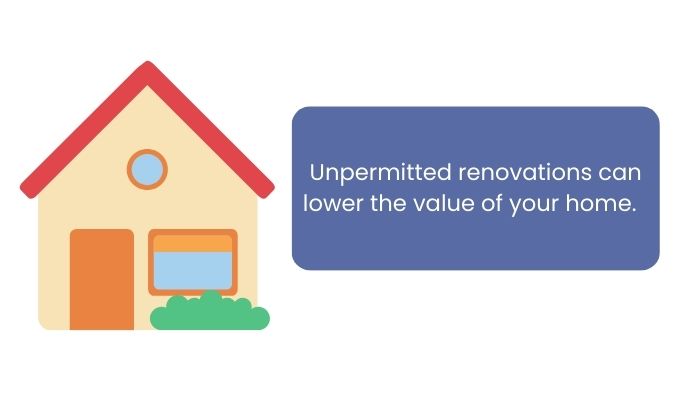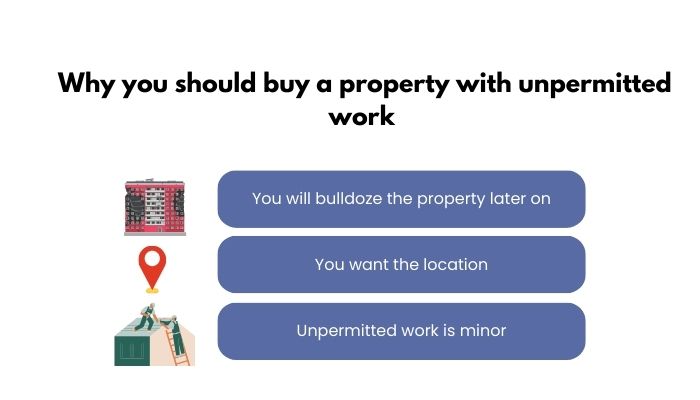No matter where you’re looking to buy property, you’ll probably find that some of the work done was never permitted. With a small handful of exceptions, in most jurisdictions, homeowners are required to pull permits to complete certain work, like building sheds, installing central heat, connecting outbuildings to electricity and plumbing, replacing or installing water heaters, and performing various DIY renovations.
In most cases, it’s not illegal to sell a home with unpermitted work, but if such work is disclosed, the buyer will usually be required to obtain retroactive permits for the work immediately after the sale goes through.
It’s also one of the rental property red flags we have discussed previously.
Unfortunately, there’s no guarantee you’ll be able to get a permit if the work was done incorrectly and not to code. In that case, you might be required to restore the property to its previous condition by uninstalling and/or destroying the unpermitted work.
Contents
Why is unpermitted work so prevalent?
People perform work without getting building permits for a variety of reasons.
Many people don’t want to increase the value of their property since their property taxes will also rise. Others don’t want to pay for the permit or experience delays while waiting for approval. Sometimes people don’t even know certain work requires permits, leading to unpermitted construction that may not comply with building codes.

On the other hand, many homeowners build unpermitted additions, like extra rooms, thinking they’ll keep their home forever and never sell, or they want to add value to the home. Later on, when they decide to sell, they’re shocked when the appraiser skips their obviously unpermitted work and values the home much lower than expected. A real estate agent will often help sellers discover unpermitted work during the transaction process, which can complicate negotiations or even lead to issues with local authorities.
In any case, unpermitted work is common, so you can’t avoid it completely. And in some cases, it’s not going to pose a problem—unless a previous owner left behind work that doesn’t meet current building codes.
Unpermitted work doesn’t mean a property is a bad investment
Although it can be risky and can add more to your workload, buying a property with unpermitted work isn’t necessarily something you should avoid. However, it’s not always the right move. Consider the following factors before making your decision.
3 Reasons to buy a property with unpermitted work
Sometimes it’s perfectly fine to buy a home with unpermitted work, and here are some situations that make it a good choice.

-
You plan on bulldozing the property to build something new
Having plans to tear down a property and build something new is a good reason to not worry about unpermitted work. If you’re going to bulldoze everything anyway, you can’t be held responsible for fixing unpermitted work, as long as you complete your work within the appropriate time frame dictated by your local laws.
-
You want the location more than the house itself
If you’re looking at a property for sale because of the location, then it’s sometimes worth buying even if the entire property was never permitted. For example, say you want to buy a house on a specific block in the country to live near a friend or family member, but your only option is a house that was never permitted in any way. Even if you have to tear everything down, consider it the price of living in your desired location.
Another potential scenario is wanting to buy land so you can build a new house, but not being able to get the land you want. Your only option might be to buy land with an existing home and remodel it how you wish. In this scenario, you could end up tearing down the unpermitted work anyway.
Yet another potential setback you might encounter in the country is that not all land can be developed. For example, some pieces of land have a high water table that prevents anyone from legally building a conventional septic system with a leach field or mound septic systems. Laws vary by state, and in some areas, even proven solutions to this problem aren’t legal because they haven’t been tested and approved by the city’s health department.
When that’s the case, and there’s no sewer hookup, you can’t build a house on the land unless you install a composting toilet system, which may not be legal in the area. In this situation, the land would be useless to you. However, if there happens to be another house with land for sale in the area, you can buy it, bulldoze it, and build your new construction.
-
The unpermitted work is minor
Almost all homes have some kind of unpermitted work, and the older they are, the more likely that’s the case. However, it’s not always a big deal. If the work done was minor or not hard to fix, it may never become an issue for you. Unpermitted work usually only becomes a problem when it’s reported somehow, or you need repairs and can’t get a licensed professional to do the work because of how it was previously done.
If a homeowner doesn’t disclose unpermitted work, and the building inspector doesn’t notice, it may never become a problem for you. A lot of inspectors don’t even notice or suspect unpermitted work has been done unless the person who cut corners did a bad job at hiding the evidence. Minor work done well is unlikely to be discovered.
4 Reasons to avoid buying property with unpermitted work
For some people, buying a home with significant unpermitted work is a bad idea. Here are some of those scenarios.
-
Tearing DIY additions down is costly
The biggest risk of buying property with unpermitted work is being forced to tear it down and rebuild it to code. Since there’s no guarantee you can get work retroactively permitted, you won’t know until you buy the property and attempt to get a permit from the city’s building department. If the construction work wasn’t done to code and it isn’t a simple fix, you’ll be required to tear it down.
If the unpermitted construction was an extra bedroom or office, for example, you can expect to pay between $22,000 and $80,000 to have it torn down and replaced. This extra expense will drastically increase the total cost of the property, and it will be unnecessary since there are plenty of other properties with permitted renovations.
-
Insurance claims might be denied
Many property owners have been able to get unpermitted additions covered under their insurance policies, but that’s not always the case. In fact, if you have an issue that can be attributed to unpermitted work, your insurance company might deny your claim, citing illegal work as the cause. For instance, if you have an electrical fire in your basement, and it was finished without a permit, your claim will probably be denied if the insurance company can see that the work wasn’t permitted during their initial inspection.
-
It might be difficult to sell the property later
The presence of unpermitted work can make it difficult for you to sell the property later. Just because you bought the property without an issue doesn’t mean other people will feel the same. Some people won’t buy a property even if you disclose the unpermitted construction because they don’t want to take the risk.
Issues like encroachments beyond the property line or work that doesn’t comply with zoning regulations can further complicate the entire process. Buyers may also be wary of misleading real estate practices that obscure the risks of purchasing a home with unpermitted additions.
-
There are fines and penalties for unpermitted work
Last, in addition to being forced to tear down unpermitted work, you could be fined for not being in compliance. Fines can range from hundreds to thousands of dollars, and in some cities, like Seattle, fines accumulate daily. The local government may require you to visit the zoning office to correct violations, and in some cases, you may have to pay hefty permit fees. In a worst-case scenario, the city might take your home through eminent domain proceedings if violations remain unaddressed.
To buy or not to buy? It’s your personal choice
Buying property with unpermitted work isn’t always a bad decision, but in some situations, it can become problematic. However, sometimes the benefits outweigh the risks, and other times it’s not a big deal. Since every situation is different, it’s crucial to weigh the pros and cons of buying a property with unpermitted work. If you’re not sure what to do, seek professional advice before making a decision.
- 10 Common Mistakes New Real Estate Investors Make - March 13, 2025
- 6 Different Ways to Generate Cash Flow With a Rental Property - September 2, 2024
- Should You Buy Property Built Without a Permit? Important Considerations - September 2, 2024

